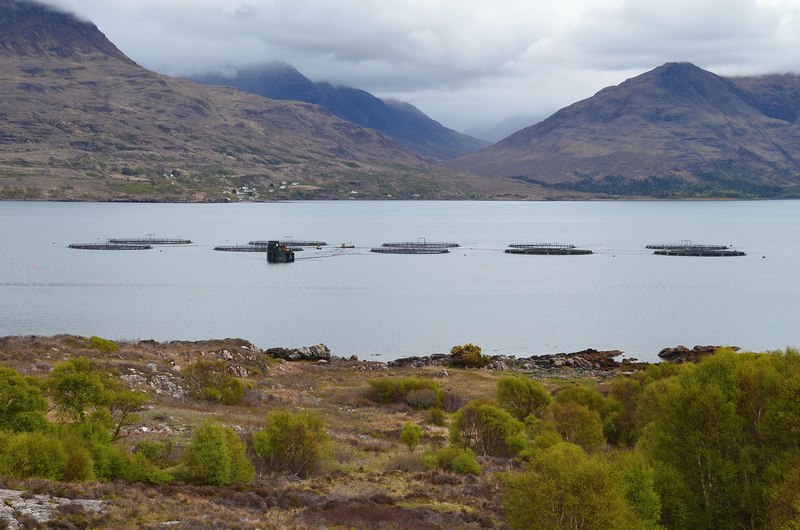The Scottish Government has been accused of intervening to block a ban on a toxic pesticide blamed for killing wildlife after pressure from the fish farming industry.
Government officials helped persuade the Scottish Environment Protection Agency (Sepa) to drop a plan to phase out emamectin by 2018 – despite new scientific evidence that the chemical was causing widespread environmental damage in dozens of sea lochs across Scotland.
Campaigners accuse ministers of sacrificing the environment by “muzzling” Sepa and are demanding an immediate ban and a parliamentary inquiry. The Scottish Government, however, describes the accusations as “unsubstantiated and false”.
Emamectin is widely used by fish farms to control the lice that plague caged salmon. But it escapes and contaminates the seabed, where it can be fatal for crabs, lobsters and other crustaceans.
After a scientific study linked the pesticide to “substantial, wide-scale reductions” in marine wildlife Sepa planned to announce a ban in August 2016. But internal emails released under freedom of information law show that a complaint from fish farmers prompted officials in the environment secretary Roseanna Cunningham’s department to intercede.
The chief executive of the Scottish Salmon Producers’ Organisation (SSPO), Scott Landsburgh, contacted government officials on 9 August 2016 with “serious concerns” about Sepa’s planned announcement the next day. Cunningham should be “urgently” alerted, he said.
Officials “flagged this up” with Cunningham and said she was “content” to talk to Sepa’s chief executive, Terry A’Hearn, in the morning. In the event, though, her officials spoke to A’Hearn later that evening.
The next day Neil Ritchie, from the Scottish Government’s Environmental Quality Division, emailed the Minister’s office referring to “our discussions last night”. Ahern’s “subsequent reflection has been that Sepa will not issue an article along the lines that had been initially proposed”, Ritchie said.
No announcement was made and Sepa’s proposal to phase out emamectin by 2018 was withdrawn. Instead, the rules for using the pesticide were tightened up.
Other released emails reveal that Sepa also came under pressure to drop the planned ban from the SSPO and emamectin’s manufacturer, the US drug company Merck. On 8 August 2016 Merck Animal Health’s head of global aquaculture, Chris Beattie, accused Sepa of making “inflammatory and misleading statements”.
He wrote: “Evidence still appears fragmentary at best making any public discussion on regulation or removal seem premature and likely to cause unnecessary media attention, a loss of scientific credibility, undue criticism of all parties involved and ultimately damage to the Scottish fish farming industry.”
Documents released by Sepa show that it spent many months considering what to do about emamectin, with experts recommending a “complete suspension” within two or three years. “We are duty bound to make a decision based on the impact on the environment and not the consequences for industry,” wrote Sepa’s aquaculture specialist, Dr Hazel Macleod, on 20 October 2015.
At a meeting in April 2016 Sepa’s management team discussed formal recommendations for a suspension. Though they were not approved as they stood, managers “agreed with the direction contained within the report, and requested further consultation on the detail before taking final regulatory decisions”.
Mark Ruskell MSP, environment spokesperson for the Scottish Greens, was shocked by the revelations. “The salmon farming industry appears to have used its influence at the heart of government to suppress independent scrutiny,” he said.
“There is an urgent need for parliament to run an inquiry into salmon farming and the growing failure to regulate an industry which has been given free reign by ministers to expand way beyond the limits of the environment.”
Scottish Labour’s environment spokesperson, Claudia Beamish MSP, described the disclosures as “deeply concerning”. The SNP government should be doing all it can to protect Scotland’s natural heritage, she said.
“The SNP is in danger of being viewed as increasingly beholden to lobbyists and special interests – not the people it was elected to represent.”
Guy Linley-Adams, a lawyer for the wild fish group Salmon and Trout Conservation Scotland, accused the Scottish Government of being “too close for comfort” to the multinational salmon farming industry. “It has shown itself quite prepared to sacrifice the wider Scottish environment and, in the process, to muzzle its own environmental watchdog,” he said.
Sepa had been been “silenced at the behest of the salmon farmers,” he argued. “It is high time MSPs of all parties forced the Scottish Government to bring the salmon farmers under proper control.”
Don Staniford, director of the Global Alliance Against Industrial Aquaculture, attacked the Scottish Government for acting as a “proxy for industry”.
He said: “Under this government, Sepa’s powers have corroded away. The scientific evidence is so damning that it demands an immediate ban on the use of emamectin.”
Sepa’s chief executive, Terry A’Hearn, stressed that he took the decision not to publicise Sepa’s approach after considering a range of views, including those of the industry and Scottish Government officials. “I did not discuss the matter with the Cabinet Secretary,” he said.
“It was my decision. I’ll take responsibility for it. People will judge whether it is right or wrong.”
Sepa is now working hard on a new regulatory framework for the fish farming industry. According to A’Hearn, it would be out for consultation in the next few months.
The Scottish Government confirmed that Cunningham did not talk to A’Hearn. “These documents do not in any way support the unsubstantiated and false claims being made,” said a government spokesman.
“Officials have a duty to provide ministers with considered advice and to inform them of stakeholder concerns. There is nothing to suggest officials made any recommendation on how to proceed. The use of chemicals in the marine environment is a regulatory matter for Sepa.”
The Scottish Salmon Producers’ Organisation declined to comment.
Other documents released by Sepa are available as F0187415 and F0187683 via its online disclosure log.
Photo thanks to Jim Barton, licensed for reuse under this Creative Commons Licence.
A version of this article was published in the Sunday Herald on 18 June 2017.














